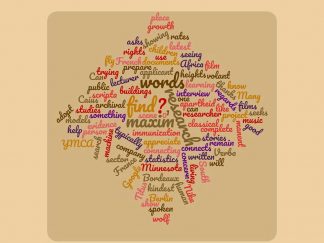By Allison Campbell-Jensen
 Was the YMCA showing films in Bordeaux, France, from 1912 to 1919? A French lecturer in film studies would like to know.
Was the YMCA showing films in Bordeaux, France, from 1912 to 1919? A French lecturer in film studies would like to know.
To complete a research project, one person asks what heights were stories in buildings, typically, from 1892 to 1912?
“A Google search will show that the maxim ‘Verba volant, scripta manent’ (spoken words fly; written words remain) is often traced to a speech by Titus Caius, who is sometimes identified as a Roman senator. Who was Titus Caius, and what evidence connects him to this maxim?”
“I am trying to find a good place where I can find statistics on immunization rates for children living in South Africa during apartheid.”
To prepare for an interview at Nike, an applicant would appreciate seeing the latest company research.
“[H]as [there] been growth in public sector use of machine learning models. Is this something you could help me with?”
A researcher seeks archival documents connecting the classical music scene with concern for human rights, from 1975 to 2001. “Many thanks and kindest regards from Berlin!”
And simply: “Can I adopt a wolf in Minnesota?”
Responding to these out-of-the-blue questions via 24/7 online chat is enjoyable work, says Tiffany Reichard, Library Assistant in Walter Library, and one of the University of Minnesota Libraries virtual reference team. “I loved being able to chat with people all over the world, hear about their research, and learn new things right along with them.”
Staff who monitor the chat also can refer questions to subject specialists and liaisons.
Meeting needs online
In this time of sheltering in place from COVID19, there has been an increase in the reference questions that come in online through the Libraries’ 24/7 Chat and email queries and in partnership with Minitex’s AskMN service. The Libraries usually average 9,000 questions a year but this year, they had the busiest March and April ever.
AskMN’s network of 39 academic and public libraries responds to an average of 32,000 questions annually, says Carla Pfahl, AskMN.org Coordinator at Minitex. Compared with 2019, the months of March and April 2020, AskMN staff overall have seen increases of 19% and 39% respectively. And they are responding any time, day or night.
“To do this, we joined the 24/7 Reference Cooperative that brings together libraries from Hawaii to the U.K.,” Pfahl says, “to cooperatively assist each others’ patrons when needed.”
The Libraries were well-positioned for the COVID-19 bump, says Kate McManus, Virtual Reference Coordinator, Magrath Library, because they have been doing chat and virtual reference since 2008. Minitex launched AskMN in March of that year and the Libraries joined three weeks later.
Even so, during this time of dealing with COVID-19, working in virtual reference has been especially fulfilling, says Mary Armstrong, Student Supervisor, Saint Paul Campus Libraries.
“It gives me the opportunity to continue to help patrons and to see that our resources are still being utilized even when our buildings are closed,” she says. “The closures come with a set of whole new challenges as we do not have access to physical collections. This makes it even more rewarding when I am able to track down a digital version of what the patron needs.”
Open to all
There’s been an effort to include links to 24/7 chat and the Contact Us form on all the Libraries’ web pages and within the catalog, to best assist users, says Phil Dudas, Information Services Manager, Wilson Library.
“Academic research can be frustrating, and the information landscape is increasingly complex,” he says, so “we want to provide that safety net for our users.”
Occasionally, school kids use the service to try to play jokes on the reference librarians but, more seriously, some people are seeking advice on legal or medical questions or even mental health issues. The librarians have guides to help patrons find a service to help.
Anyone can ask a question; they do not have to be affiliated with the University of Minnesota. And the result is grateful patrons.
One wrote: “This service saved me so much anxiety and stress about searching for the right place to start. I was given sources and databases that were perfect for my research. Thank you!”
For the potential wolf adopter, however, the howl for help had to go outside the U; the question was referred to the Minnesota Department of Natural Resources.



